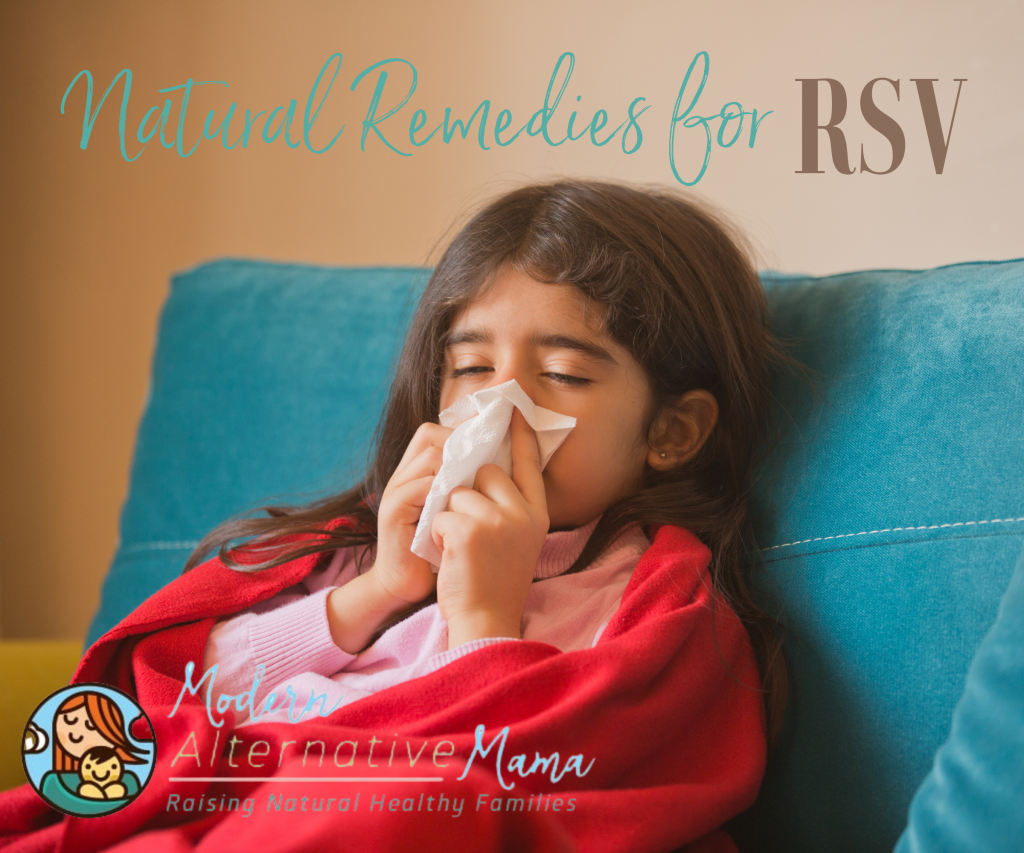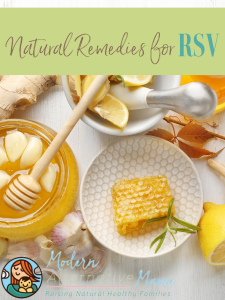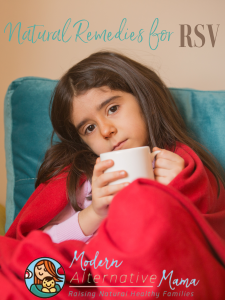By Rustina, Contributing Writer
Have you ever stayed up late just watching your little one’s chest rise and fall, worrying about every hitch in the rhythm? Me too. It can be so frightening when your baby or young child is struggling to breathe. That fear seems to be manipulated often, especially the last decade or so.
This winter, the news has been saying RSV is hitting harder and sooner this year due to the efforts of reducing viruses the previous two years. Combine that with the worries every parent has about breathing difficulties, and whether you are a new parent or well seasoned, the fear can start creeping in. When fear is near, I like to start researching!
While I love studying topics, I am not a professional health provider – I am just a Mom. I can’t give medical advice nor can I treat, cure, or diagnose anything. So why am I writing this? I want to share about what I have learned that helped me feel more confident as a parent and caregiver to my precious boys.
What is RSV
RSV stands for Respiratory Syncytial Virus (pronounced sin-ˈsi-sh-ee- el). It is an extremely common virus that causes an infection in the lungs and respiratory tract (1). For the most part, the symptoms are the same as a cold. Any age group can get RSV, but the most at risk for severe symptoms and complications are infants and those with health concerns such as weakened immune systems, heart, or lung diseases.
It is assumed that the majority of people have experienced RSV by the time they turn 2 years old. For most, the virus takes about a week to run its course.
Symptoms of RSV
Common Symptoms – these occur, generally, in stages, not all at the same time (2):
- Runny nose
- Decrease in appetite
- Coughing (usually more of a wet cough)
- Sneezing
In infants, there may be other signs, such as the usual not feeling well like (3):
- Fussiness or irritability outside of naptime or hungry signs
- Decreased appetite
- Minimal interest in activities they normally engaged in
But with the addition of:
- Changes in breathing pattern
More Severe Symptoms:
- Wheezing
- Fever
- Worsening Cough
- Possibly develop pneumonia or bronchitis
- Rapid breathing that doesn’t slow down
- Other signs of lower oxygen levels: bluish or grayish skin tone, headache, confusion, dizziness, or restlessness
While the symptoms are similar to those of other conditions like the flu (or that one newer virus), one of the big differences is that RSV doesn’t usually get accompanied with full body fatigue. When symptoms get more severe like mentioned above, consulting a trusted health care provider may be needed.
Treatments in Allopathic Care
While I love going the natural route as much as possible, it is good to know what the allopathic course of treatment would be if that becomes reality.
Directly from the CDC website, the most common course of treatment are these steps (4):
- Manage fever and pain with over-the-counter fever reducers and pain relievers, such as acetaminophen or ibuprofen. (Never give aspirin to children.)
- Drink enough fluids. It is important for people with RSV infection to drink enough fluids to prevent dehydration (loss of body fluids).
- Talk to your healthcare provider before giving your child nonprescription cold medicines. Some medicines contain ingredients that are not good for children.
If the condition becomes serious, then oxygen, IV fluids, or intubation may become options also.
There is a monthly injection called Palivizumab, or Synagis, that can be given once a month with monoclonal antibodies that they feel can prevent RSV during high risk months (5). This is the current “vaccine” available for RSV. There are others in various levels of testing, but they are not available yet.
Synagis does have some concerning possible side effects such as (6):
- Severe rash, hives, or itching skin
- Swelling of the lips, tongue, or face
- Swelling of the throat, difficulty swallowing
- Difficult, rapid, or irregular breathing
- Bluish color of skin, lips, or under fingernails
- Muscle weakness or floppiness
- Unresponsiveness
Sometimes, an antiviral medication called Ribavirin is used to treat RSV in severe cases (7). This drug comes with many warnings and side effects, and cannot be used alone. It must be used with Interferon – an immunosuppressant – that also has many different side effects and adverse events associated with it (8).
Besides flu-like symptoms, there are risks associated with Ribavirin/Interferon treatment:
- Depression
- Suicide
- Insomnia
- Anemia
- and other issues
Neither of those sound like a situation that a parent wants to worry about and have to make those choices. Which led me to research, what can I do at home to help my kiddos when we run into RSV?
Natural Remedies for RSV
Now that we talked about some basics, let’s talk about the natural living and holistic approach to RSV!
Addressing the Virus
The first step before we even come across anything is to support the immune system. It can handle most things when given the regular support and care it needs. With some infections there are causes or predispositions that may make the risk greater for some people compared to others.
The immune system is the body’s response to something that it does not accept as part of the body. These cells that cause this reaction are called antigens. Those may be bacteria, viruses, fungi, or any other substance that should not be in the body. The immune system specifically reacts to the proteins on the surface of these cells. Once the immune cells become attached to the antigen, the immune system will send out the proper response to eliminate that invading cell (9).
There are two types of ways the immune system reacts: Innate and Adaptive. These two parts of the system work closely together.
Innate immune system is a nonspecific, immediate response that sees any antigen and sends out immune cells to capture, contain, and kill the antigen. It’s like a roomba that just roams around and happens to come upon a mess to clean up.
Adaptive immune system is a specific or acquired response. This is where our antibodies come into play. This is the part of our immune system that stores data about previous antigens it has encountered. The immune cells like the natural killer cells, phagocytes, and even the lymphatic system’s lymphocytes recognize the antigen and activate a response to get the saved antibodies on the task of eliminating it (10). This system is always learning, and can even change its response to match new information it learns about each antigen!
Together, these work to make a strong immune system that protects us. So how can we help it?
- Get plenty of whole food nutrition from a varied diet, especially:
- Vitamins: A, C, D, and K
- Vitamin A and D can be obtained from Cod Liver Oil
- Vitamin C rich fruits like apples, oranges, and strawberries – Electrolytes, antioxidants, fiber, and nutrients
- Vitamin K can be found in Leafy Greens and Earthley’s Vitamin D Cream (made with Cod Liver Oil)
- Minerals: Magnesium, Zinc, and Selenium
- Magnesium can be absorbed through the skin with Good Night Lotion
- Zinc and Selenium can be found in Oysters
- Vitamins: A, C, D, and K
- Elderberry – Antioxidant, may reduce flu and cold symptoms (11), quercetin, and nutrients
- Raw, Local Honey – Antibacterial, antiviral, antifungal, minerals, vitamins, enzymes, and powerful antioxidants
- Bone Broth – Collagen, electrolytes, glutamine, and nutrients
- Try this Bone Broth Hot Chocolate Recipe!
Addressing the Symptoms
The next step is to look at all the symptoms to determine where extra support is needed, and what may be able to help.
As a recap, these are the RSV Symptoms that commonly need to be addressed:
- Runny Nose
- Chest congestion – Epsom salt bath, humidifier, steamy room
- Breathing Discomfort
- Sore throat from coughing – honey,
- Dehydration – bone broth, breastmilk, popsicles made from water and juice,
- Fever
If you like a good DIY option, check out this great helper: DIY: Immunity Tincture
My favorite remedies to keep on-hand: Feel Better Fast, Elderberry Elixir, Good Night Lotion, Immune Aid – Vitamin C, Cod Liver Oil, and Nourish Me Naturally
Addressing Runny Noses, Chest Congestion, and Breathing Discomfort
This is always fun, isn’t it? You end up feeling like you harass your child every 5 minutes to wipe their nose – and then, their poor little nose ends up looking all raw and red after a while! We have to keep it clean though. What’s a mom to do?
Some tips for making the symptoms more comfortable:
-
- Gentle but frequent nose blowing
- Apply a salve to the nose area after or if really sore apply to the tissue before wiping.
- You can make this First Aid Salve to use or Earthley’s All Purpose Salve
- Get your kiddo to have fun with having their nose wiped by making it a contest
- Who can blow the longest, loudest, or most comically? Give it a funny little name and they might just get a little excited! I have heard people call it Snot Rocket Race and Booger Boogie Bout.
- Apply a salve to the nose area after or if really sore apply to the tissue before wiping.
- Gentle but frequent nose blowing
- Hot Steamy Room
-
- Run a nice hot shower so the bathroom gets all steamy, and hang out in there for a while so the steam can help loosen chest or nasal congestion and provide the needed moisturizing for the sinuses.
- Use a humidifier for the same reasons.
Herbs, Food, and EOs to Use in Natural Remedies:
- Nettle leaf – antihistamine
- Elderberries – immunomodulator
- Turmeric root – anti-inflammatory
- Dandelion root – antiviral
- Mullein leaf – expectorant
- Fenugreek seed – anti-inflammatory and antibacterial
- Honey – antibacterial, antiviral, and so much more (see some ideas below)
- Garlic – antibacterial and antiviral (Have you tried making GOOT?)
- Ginger – anti-inflammatory, soothes tummy, and warming to relief discomfort
- Comfrey – induces a mucilage effect to soothe cough
- Lemon essential oil – anti-inflammatory and relaxing
- Rosalina essential oil – contains Eucalyptol – just like Eucalyptus another great EO
- Balm mint bush essential oil – expectorant
- Clary Sage essential oil – eases stress and helps with congestion
The herbs can be used in teas, tinctures, or salves. The EOs can be used diluted in creams or salves.
Honey is a great antibacterial, antiviral, sore throat soother, immune system booster, and helps with digestion! It can be used plain by the teaspoon or in a number of recipes. Try these ones out:
Soothe a Cold with Lemon & Honey
Another great option (without honey) is DIY: Cough Away Tincture.
My favorite remedies to keep on-hand: Breathe Well, Cough B Gone Herbal Extract, and Sinus Saver.
Addressing Dehydration and Fever
Nearly every parent fears fevers. As soon as your little one spikes a fever, all the research we have read about not to worry, goes out the proverbial window!
Just try to remember, a fever is not an illness. It is a symptom of an illness. It’s a sign that the body’s immune system knows it has a job to do, and it is trying to do it!
Usually, the body doesn’t allow a fever to go high enough to cause damage to the body. Dangerously high fevers are almost always the result of a metabolic disorder, a reaction to medication/vaccine, or reaction to an external source (like heat stroke).
If the fever does go high or your child is very uncomfortable and/or lethargic, you should see a trusted health care provider.
You can read a lot more about fevers and the temp ranges in Earthley’s Guide to Fevers.
When the body has a fever, it’s burning through its resources to overcome the sickness. This means that you need to give the body what it needs to keep fighting without crippling it in the process. There are several simple, effective ways to do this.
Some tips for making the symptoms more comfortable:
- Baths
- Baths with Epsom salt can help to sweat out a fever
-
-
- Keep temp moderate – not too hot or too cold
-
- Herbal baths
- Ginger (speeding up circulation and inducing perspiration)
- Yarrow (relaxes the skin and opens the pores)
- Calendula (anti-inflammatory, may help reduce fever)
- Hydration
- Drink water. Seems obvious, we know, but we also know we all need that reminder sometimes too!
- Watermelon, Coconut and Cucumber are great water sources when you need a drink and a snack.
- Electrolyte drinks like Earthley’s Electrolyte Powder or this Ginger-Lemon Electrolyte Drink recipe.
- Add fruits and herbs to your water for more flavor when you need that extra taste (lemon, raspberries, mint, etc)
- Herbal teas
- Worried about your water? Check out these articles: Water Filtration: What You Need To Know and Which Water Filtration System is Best?
- Rest
- I know we all know this, but in today’s crazy, busy world, we need the reminder! Rest doesn’t mean being trapped in bed all day against your will, but it does mean not working. Spend some time reading for a good, long while in your favorite comfy chair or laying in bed relaxing.
Herbs, Food, and EOs to Use in Natural Remedies:
- Echinacea – immunomodulator
- Fennel seed – antimicrobial
- Astragalus root – antibacterial, immunomodulator
- Cinnamon – antibacterial, antiviral, warming to help with soothing pain
- Calendula – anti-inflammatory, pain reducer
- Elderberries and flower – immunomodulator and a good source of vitamin C too!
- Dandelion root – antiviral
- Catnip – relaxing and induces mucilage to soothe throat
- Lemon Balm – relaxing and antiviral
The herbs can be used in teas, tinctures, baths, or salves.
Try these 6 Foods That Support Your Immune System.
My favorite remedies to keep on-hand: Feel Better Fast, Elderberry Elixir, Electrolyte Powder, Immune-biotic, Soothing Herbal Bath Tea, Herbal Detox Bath, and Greens Powder.
Disclaimer: This post is not intended as medical advice. These statements have not been evaluated by the FDA, and nothing in this post is intended to diagnose, treat, or cure anything. If you have questions, please do your own research or seek advice from a health professional.








